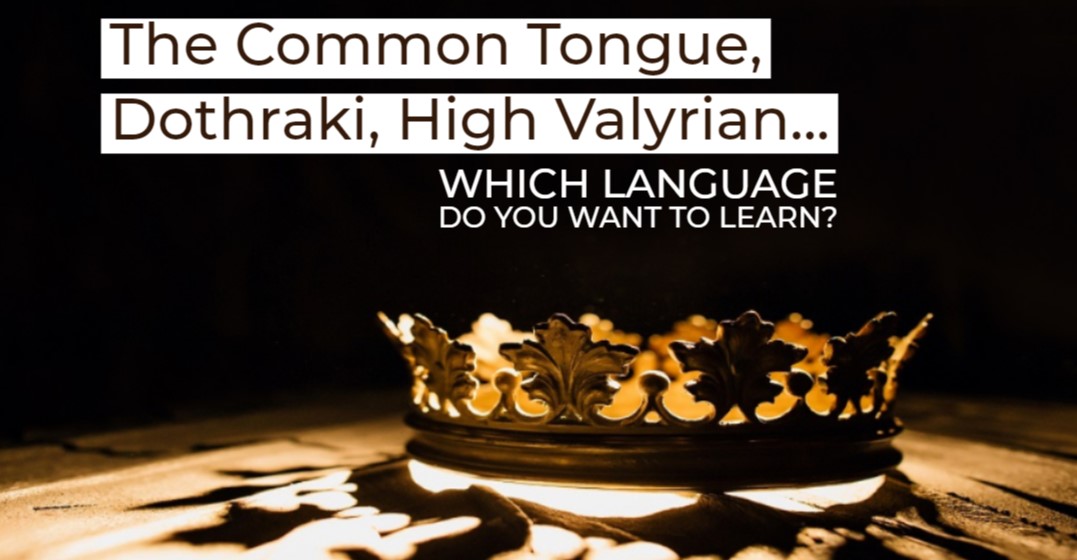by Laura Jones
Updated on January 12, 2024
Have you thought about which language you want to learn next? Mandarin maybe? Arabic? How about Dothraki or High Valyrian?
If you’ve got no idea what I’m talking about, you’re obviously not a Game of Thrones fan.
Dothraki and High Valyrian are just two of the languages which characters on the hit show speak. And yes, people are learning them.
I’m a huge fan of Game of Thrones, but it’s not just the gripping plot, complex characters, and wonderful costumes and settings that make me love GoT. As a huge language nerd, I like hearing how the characters in GoT speak. David Peterson, a linguist, actually created two of the languages in full, almost from scratch – amazing!
Read on to find out a little more about the languages of Game of Thrones.
The language we hear the most often in Game of Thrones is spoken in Westeros, where the majority of the action takes place. Westeros is the home of the beloved Jon Snow and the House of Stark, as well as the more sinister Lannisters.
The Common Tongue is represented by the English language in the book and the TV show. However, the characters have different accents to signal to audiences where they come from or what their status is. (This probably only makes sense to British audiences). Jon Snow and some of the Starks have a Yorkshire accent, which is widely considered in Britain to be an accent of gritty determination in the face of adversity – yes, we can read that much from it! Then there’s Received Pronunciation, the second most widely used accent: this signals that the person is educated and, perhaps, a bit on the posh side. This is the accent of Sansa and Arya, Daenerys, and some of the Lannisters, among others.
Another language that people are trying to learn – Dothraki is spoken by the nomadic horsemen of the plains of Essos, so it’s no surprise that its creator, Peterson, was inspired by the language of the Mongols of the time of Ghengis Khan. That means that their vocabulary reflects their lifestyle and landscape. The Dothraki have a word for ‘pride’, for example, but no word for ‘book’ because they are illiterate.
This is probably the best known of the GoT languages. In fact, 100,000 people in the UK have signed up to a Duolingo course to learn High Valyrian. In GoT however, High Valyrian is a language which we might compare to the Latin of the past: used by scholars and the elite, but not really a living language. In earlier times in GoT, it was spoken across Essos, the second largest continent after Westeros.
This is the language spoken by the wildlings who live a long way north of the Wall. It’s an ancient language which pre-dates the Common Tongue. It’s rune-based; the early Germanic languages (Scandinavian and Anglo-Saxon) were also rune-based, though the societies later took up the Latin alphabet. The parallels with real history are fascinating in GoT (but that’s a story for another day!).
Peter Brown is the Sound Designer on GoT and he created the screeches that signify Skroth. Used by the White Walkers, it sounds like breaking ice, and is quite spine chilling. A fitting tongue for the greatest supernatural threat in GoT.
If High Valyrian can be compared to Latin, Low Valyrian is the Romance Languages. Like the French, Spanish, and others which evolved from Latin, Low Valyrian is comprised of a number of vernacular languages derived from High Valyrian. The languages are spoken in different cities of Essos and they are growing away from each other, becoming mutually unintelligible, much like French and Romanian have today.
Old Ghiscari is a dead language by the time the action of GoT happens. A few of its words have survived into the Low Valyrian spoken in Slaver’s Bay, the most notable being the word ‘mhysa’ meaning ‘mother’. Modern-day English has lots of words which survived from dead languages; even the names for the days of the week come from Old Norse.
These three languages are little mentioned in GoT. Asshai’i is a magical language of witches and placing curses, used in the far east. Qarth is said to be very difficult to learn for foreigners, so the inhabitants of Qarth use the Common Tongue to communicate with outsiders. And Lhazar is mentioned only a few times as the language of the shepherds of Essos.
So, once you’ve mastered English with Lingoda, what do you fancy? The intellectual High Valyrian or the Dothraki of warriors and nomads?
